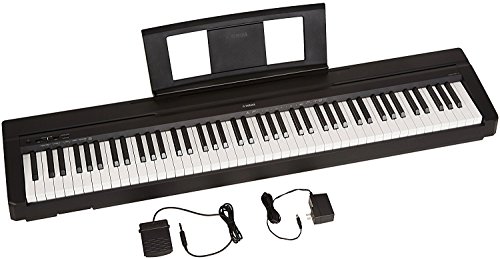
The Yamaha P71, part of Yamaha’s extremely popular “P-line”, is a decent beginner level digital piano. It’s full size with 88 fully weighted keys, includes all of the features and sound quality that beginner to intermediate players would need while developing their piano skills.
That being said, I personally feel that there are better alternatives in most cases. If you’re looking to save as much money as possible, the Alesis Recital 88 key digital piano is about half the price and offers similar features and sound quality. If you’re looking for the best value possible, the Donner DEP-20 digital piano offers higher polyphony, more tones, an LED display, and overall better performance.
Pros | Cons |
|
|
Specs & What’s Included
- Dimensions: 52.25 x 11.5 x 6 inches
- Weight: 25 pounds
- 88 fully weighted keys
- 10 voices/instrument sounds
- Power supply & foot pedal
- Dual mode
Design

The P71 doesn’t take up too much space with a depth of less than 12 inches, so it will fit in most practice spaces or home studios and is a relatively portable digital piano. The piano features minimal controls, just a few buttons and sliders for the power, voice, volume and mode settings, so if you’re looking for a more sleek design this piano could work. It comes with a paper stand in the back, but does not include a bench or piano stand. It’s currently only sold in black, and overall looks pretty good.
Keyboard

Weighted Keys
The Yamaha P71 comes with fully weighted piano keys, meaning the resistance when you’re playing feels more like an acoustic piano. Not only do these feel much more natural and fluid to play, they also more serious players get used to typical acoustic key weights, making the inevitable transition much easier.
Full Size
The Yamaha P71 comes with 88 keys, meaning it is a full size digital piano. This is also important in getting as close to the feel of acoustic pianos as possible. It isn’t as important for beginner players, but many intermediate and advanced pieces require all 88 keys, so the earlier you can get used to playing a full sized piano the better.
Features
64 Note Polyphony
Polyphony is the amount of notes a piano can output at the same time. This really only matters when you’re using sustain or layering tracks as you won’t ever be playing 64 notes at once otherwise. Once you start using the sustain pedal to play chords over each other and/or using voices that produce multiple notes per key it becomes possible to hit the 64 note limit. Once this happens the piano will simply start to drop some of the notes, making the overall sound less full and complete. This isn’t an issue for beginner players, as you progress to intermediate and advanced we recommend moving to at least 128 polyphony.
Dual Mode
Many Yamaha piano’s come equipped with dual mode, and the P71 is no different. This setting lets you combine voices together, such as strings and piano, to create some interesting sounds and effects. I personally love experimenting with things like this, it’s a great way to keep practicing fun and interesting.
Sound Quality
The sound quality is good for the price you pay. While I think there are better deals out there (as mentioned at the beginning of the article), I wouldn’t say that the P71 is a bad choice or that you’re getting robbed. You’re essentially paying for a minimalistic digital piano with good sound quality and great feel. Overall the sound is warm and full, the low end sounds great but the high end sounds kind of flat and quiet without great headphones or speakers.
What We Liked
I like the look of the piano, it has a sleek and minimalistic aesthetic. I also think the weighted keys feel nicer than most digital pianos at this price point. It isn’t the exact same as an acoustic piano, but it definitely is a lot closer than you’ll get with many digital pianos. The key action is smooth across the board and it’s just a fun digital piano to play.
What We Didn’t Like
As stated at the beginning of the article, I think there are better deals out there. The Alesis Recital 88 key offers very similar features and debatably on par sound quality at almost half the price. The Donner DEP-20 digital grand piano offers tons of additional features at the same cost, so either of these would be great options. Also, the headphone jack is 14″ which is kind of annoying.
Conclusion
Thanks for reading! Hopefully this article helped you determine if the Yamaha P71 digital piano is the right fit for you. It’s definitely a viable choice if you’re looking for entry level digital pianos, but we recommend at least considering some of the alternatives listed in the article.
